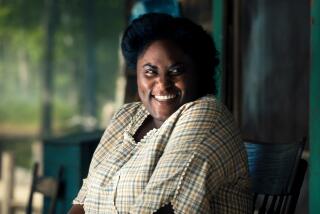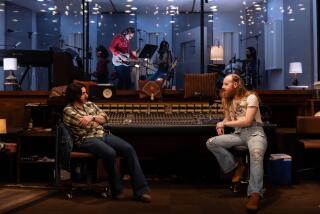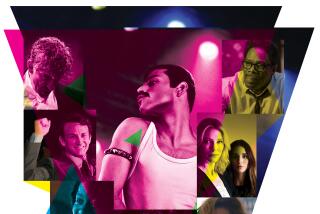A critic’s take: Why ‘Hamilton’s’ Tony Award record ushers in a new era for theater
Last year, the Tony Awards could have adopted the hashtag #TonysSoBritish. This year, the nominees announced Tuesday morning look like the anti-Oscars, so diverse is the roster.
There may not be much suspense about this year’s Tony Awards. “Hamilton,” which amassed 16 nominations, breaking the record of 15 set by “The Producers” and later matched by “Billy Elliot: The Musical,” is bound to sweep all the major musical categories.
But there’s no denying that Broadway burns brighter — and more multihued — because of Lin-Manuel Miranda’s groundbreaking musical.
See the complete list of Tony nominations
As these Tony nominations attest, “Hamilton” has ushered in a new age of multiculturalism on Broadway, where talent at long last appears to be a determining factor of success. There can be no backpedaling from this position. History has arrived, laggard as usual but unmistakable. Just look at the shows being honored this year.
“Shuffle Along, or the Making of the Musical Sensation of 1921 and All That Followed,” adapter-director George C. Wolfe’s snazzy update of the trailblazing 1921 African American blockbuster that seduced Broadway with syncopation, racked up an impressive 10 nominations (though, unaccountably, six-time Tony winner Audra McDonald got lost in the shuffle).
“Eclipsed,” Danai Gurira’s tense drama (produced at the Kirk Douglas Theatre in 2009) about the plight of women in the Liberian Civil War, picked up six nominations, including best play, direction (Liesl Tommy) and lead actress (Oscar winner Lupita Nyong’o).
A revelatory reworking of the musical “The Color Purple” also scored big, picking up nominations for best musical revival (one of the more competitive categories in this “Hamilton”-dominated year), direction (John Doyle) and lead actress (Cynthia Erivo, whose powerhouse turn gets my vote for the performance of the year regardless of category).
Broadening the diverse lineup, L.A.-based Deaf West Theatre’s “Spring Awakening,” which artfully intermixed American Sign Language and singing with a cast made up of hearing and deaf actors, was recognized with nominations for best musical revival, direction (Michael Arden) and lighting design (Ben Stanton). (Another show with Southern California roots, the Steve Martin-Edie Brickell musical “Bright Star” that was produced at San Diego’s Old Globe Theatre in 2014, received five nominations.)
Just how inclusive were the nominations? This was a year in which Oscar winners Forest Whitaker (star of a short-lived revival of Eugene O’Neill’s “Hughie”), Jennifer Hudson (whose “Color Purple” cast mate Danielle Brooks was nominated for her featured performance) and Marlee Matlin (part of the “Spring Awakening” ensemble) were left out of the running and no one had cause to cry foul.
This embrace of multiculturalism on the Great White Way may not be entirely attributable to the “Hamilton” effect, but the Broadway landscape has been permanently altered by this improbable blockbuster.
Who could have imagined the impact of this retelling of Founding Father Alexander Hamilton’s life story in a musical that fuses hip-hop and R&B with a sophisticated Broadway know-how? Not only was American history reclaimed by a company of artists of color, but Broadway’s formidable race barrier — an economic divide reinforcing the cultural one — has taken a serious hit.
Everyone knows this Tony coronation of “Hamilton,” which last month received the Pulitzer Prize for drama, is a done deal, but it’s too historic not to be thrilling. In conversation with veteran Broadway watchers, the same observation keeps surfacing: There hasn’t been a show in living memory that has leaped out of theater’s comparatively small pond into pop culture the way “Hamilton” has.
Each era, of course, has it own share of box office juggernauts. The new millennium gave us “”The Producers,” “Wicked,” “The Book of Mormon” “Jersey Boys” and, God forgive us, “Mamma Mia!” The ’90s were dominated by “Miss Saigon,” “The Lion King” (other Disney family hits escape me) and “Rent.” The Brits colonized the ’80s with “Cats,” “Phantom of the Opera” and “Les Miserables.” And the recessionary ’70s coughed up “A Chorus Line.”
But none of these shows shifted the zeitgeist quite like “Hamilton.” A confluence of factors has helped create this phenomenon. Chiefly, the artistry of Miranda, 36, a prodigy whose first Broadway show (“In the Heights”) took home the Tony for best musical in 2008.
A prolific presence on Twitter, Miranda favors variations of the phrase “secret sauce” in his high-spirited 140-character pronouncements, and it’s clear that the secret sauce of his musical is the score, which brings to Broadway the sound millennials are streaming directly into their ears. The cast recording of “Hamilton” isn’t just one of the biggest-selling Broadway albums in history — it also gave Drake a run for his money on the rap charts.
By reconnecting popular music with the contemporary stage — a link that had been lost long before Stephen Sondheim — “Hamilton” has won the favor of a whole raft of contemporary hip-hop and R&B recording artists. Prince, who saw the show in March a few weeks before he died, tweeted: “THE BEST HISTORY CLASS EVER!” Beyonce and Jay Z took backstage pictures, which wouldn’t you know, went viral.
All of this cooler-than-usual fanfare (boosted by a performance by the cast of “Hamilton” on the Grammy Awards telecast) has helped bring a new audience to the show. But the most powerful endorsement, no doubt, came from the White House, where Miranda keeps getting invited back to perform. President Obama has seen the musical more than once, and Michelle Obama, also a return customer, didn’t couch her praise in the least, calling the show “the best piece of art in any form that I have ever seen.”
Usually, this kind of sensational acclaim provokes a backlash, but that hasn’t really happened for “Hamilton,” despite a few scholars raising questions about biographical accuracy and some uproar about the skyrocketing price of virtually unobtainable tickets.
The high-octane camaraderie of the cast, which received an astonishing seven acting nominations (a credit to Thomas Kail, a shoo-in for the directing award), has been infectious. These performers are having a quintessential New York moment. But it’s bigger than that. A path has been broken for all of us.
Broadway is still a ruthless marketplace, catering to upper-income brackets. But something is changing before our eyes. Producers are taking risks on innovative directors (European auteur Ivo van Hove’s deconstructions of Arthur Miller’s “A View From the Bridge” and “The Crucible” weren’t forgotten by the Tony nominating committee) and intrepid playwrights (David Harrower’s psychologically brutal “Blackbird” was nominated for best play revival, along with lead actor and actress nominations for Jeff Daniels and Michelle Williams).
But what’s even more encouraging, the stage is holding the mirror up to nature, as Hamlet centuries ago said that it should. The front-runner for best play, “The Humans” by Stephen Karam, offers an unflinching look at how we live in this post-American-dream era. And all across Broadway, characters from different ethnic, racial and economic backgrounds are better reflecting the composite of our country and the wider world.
There’s still a long way to go, but history, thanks to “Hamilton,” is moving to a bouncier rhythm. I’ll bet even the peerless McDonald is celebrating.
Twitter: @charlesmcnulty
More to Read
The biggest entertainment stories
Get our big stories about Hollywood, film, television, music, arts, culture and more right in your inbox as soon as they publish.
You may occasionally receive promotional content from the Los Angeles Times.







